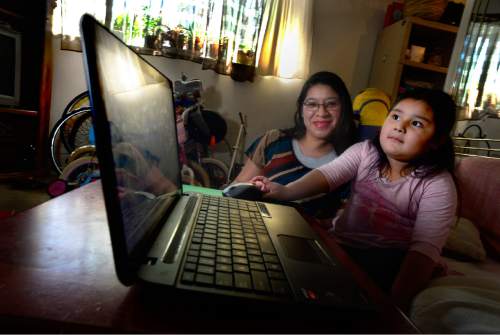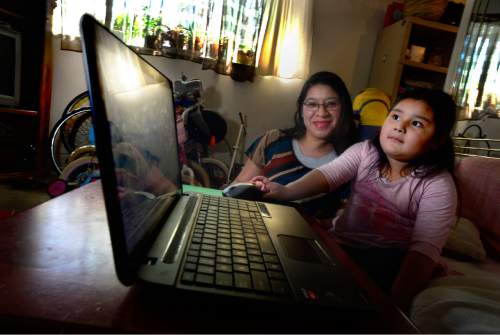This is an archived article that was published on sltrib.com in 2016, and information in the article may be outdated. It is provided only for personal research purposes and may not be reprinted.
Joselinne Mendez is refusing to do her schoolwork.
Despite encouragement from her mother, Laura De La Cruz, who coos "Sí, puede" — "Yes, you can" — and at one point offers ice cream as an incentive, 4-year-old Joselinne sits defiantly with arms crossed and head down, ignoring the laptop computer in front of her.
Usually, De La Cruz said, Joselinne is eager to sign into the UPSTART online preschool program for her daily 15-minute lesson.
But this day is different, and Joselinne feels shy practicing English in front of Isaac Troyo, UPSTART's director of outreach; Cory Maloy, a public relations representative for UPSTART's parent company; and a reporter from The Salt Lake Tribune.
"It's a very good program because it reinforces what I've taught in our home like letters, numbers, shapes, colors and sizes," said De La Cruz, whose quotes were translated from Spanish.
She said her daughter's day is divided between school time and playtime. But Joselinne often stays on UPSTART, singing in English and playing learning games, after school time is over.
Since starting the program in August, De La Cruz said, Joselinne's English skills have leapt forward.
"She talks with kids who are kindergarten age up through sixth grade," De La Cruz said. "She talks with everybody."
The UPSTART sales pitch is that 15 minutes a day, five days a week, will give children the cognitive skills they need to enter elementary school ready for kindergarten.
Developed by Waterford Institute, UPSTART was created with taxpayer investment and receives millions of dollars from the state each year to make the software free for eligible Utah families, some who also receive free computers and Internet access.
"Our target is to serve every 4-year-old in the state of Utah who wants it," Troyo said.
That vision hit a speed bump March 31, when Gov. Gary Herbert vetoed a $2 million expansion of UPSTART as part of $4.7 million worth of line-item vetoes to the education budget.
Lawmakers reacted by initiating a veto override, which Herbert sidestepped last month by agreeing to call a special session — set for May 18 — to restore the funding cuts.
But since its earliest days, UPSTART has been dogged by accusations that it receives preferential treatment on Utah's Capitol Hill.
And those concerns have resurfaced as lawmakers prepare to cut another check for UPSTART and other 21st-century learning initiatives vetoed by Herbert.
"There's a political fact about getting bills passed that fund education," said Rep. Joel Briscoe, D-Salt Lake City. "It is very difficult to get them passed if you do not throw in a component that funds something to do with software, because of the power that these companies have with certain legislators on the Hill."
Competition is key
In his veto letter, Herbert expressed a desire to evaluate and avoid overlap between Utah's public-preschool programs.
Those include SB101, which created a $10 million grant program to enroll Utah children in public-, private- and home-based preschool services.
Passage of SB101 meant that, even with Herbert's veto, funding is still available for UPSTART if it is willing to bid for it.
"The bill calls for $2 million to be used for programs such as UPSTART," said Herbert spokesman Jon Cox.
But UPSTART has a proven track record of success, according to Sen. Howard Stephenson, R-Draper, and directly funding an UPSTART expansion leaves room for other, newer home-based preschool services to bid for funding under SB101.
"We will be better off by opening up the bids to other providers," Stephenson said. "I think it's still valuable to see if other competitors can provide a similar in-home experience for students."
Briscoe sees it differently. He said singling out private companies for state funding is antithetical to the free-market practices Utah lawmakers applaud.
"We talk about loving the market," he said. "We talk a lot about competition. Why don't we let it work?"
Stephenson co-chairs Utah's Public Education Appropriations Subcommittee, the legislative body primarily responsible for setting education funding priorities.
He has been a vocal proponent of the vetoed initiatives, which, in addition to UPSTART, include an in-school reading software program for children in kindergarten through third grade, and ProStart, a culinary-arts program affiliated with "Teen Chef Masters," a reality television show in which student chefs compete for scholarships.
"I don't think it's fair to dismiss [ProStart] as a reality TV show that is not worthy of public funding," Stephenson said. "The demand has never been greater for this high-level culinary certificate program."
"Teen Chef Masters" is produced by the Utah Restaurant Association, which employs Stephenson's son Andrew Stephenson as a lobbyist.
Andrew Stephenson said favoritism was not a factor in the ProStart funding.
"I didn't present to the [appropriations] committee," he said. "I didn't lobby the committee."
Waterford, which administers the UPSTART program, is represented by lobbyist Greg Curtis, who served as Utah House speaker from 2005 to 2008.
Curtis referred questions to Maloy, who, in addition to being a Waterford spokesman, is running to represent Utah House District 6 as a Republican.
Sen. Stephenson said he is always concerned about perceived conflicts of interest but the merits of the ProStart and UPSTART programs speak for themselves.
He said there are no tools that do more to advance Utah's education goals than those vetoed by Herbert.
"I don't apologize for the fact that people I know are associated with those programs," he said. "Anybody who knows me knows that I don't give preference to anybody."
Classroom debate
About half the 5,500 children who use UPSTART are simultaneously enrolled in traditional preschool.
UPSTART's managers see it as complementary to other programs, Troyo said, not as an attempt to replace or achieve all the benefits of preschool.
But 15 minutes of targeted cognitive learning frees up time for families to work on other areas of child development, he said.
"Children starting kindergarten better prepared gives parents peace of mind," he said, "and allows them to work on playing with their children and demonstrating proper social behaviors."
Back in Laura De La Cruz's home, the promise of ice cream and the three strangers moving outside has gotten Joselinne back on track.
De La Cruz learned about UPSTART through a friend, and she said she encourages others to look into the program.
"Some people have noticed the difference [in Joselinne's English] and asked me how we got the information," she said. "I explain to them, 'Call this number, look at this page and investigate.' "
Briscoe said he could vote in favor of restoring the vetoed funds if lawmakers commit to studying the results from UPSTART, ProStart and K-3 Early Intervention.
"Let's put our money in the programs that perform better than other programs," he said. "We're talking millions of dollars — millions — and there are plenty of things in this state that need funding that don't get funded."
Herbert spokesman Cox said the question of how to best use state funds was a key issue in the governor's decision to veto.
"The governor continues to be supportive of early childhood education in the state," he said. "With scarce resources, he believes it is important to always be looking for ways to reach even more students in the most productive and cost-efficient manner possible."
Tribune reporter Mariah Noble contributed to this article.
Twitter: @bjaminwood





